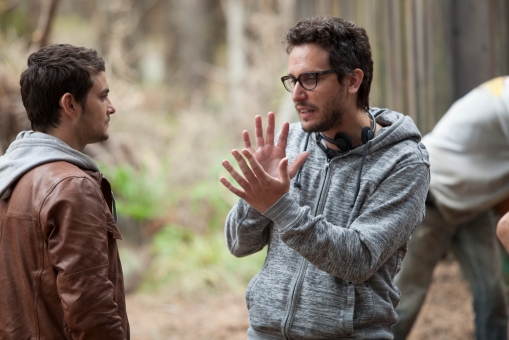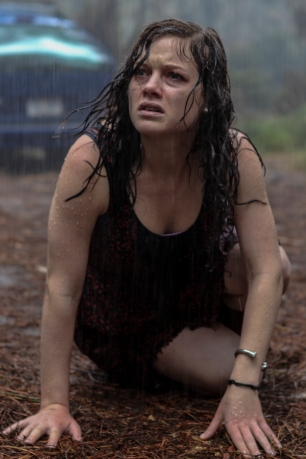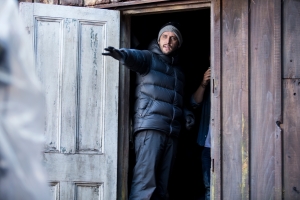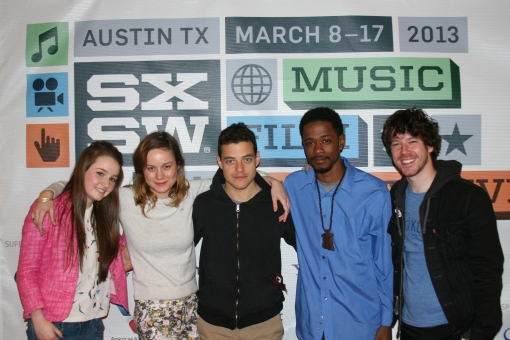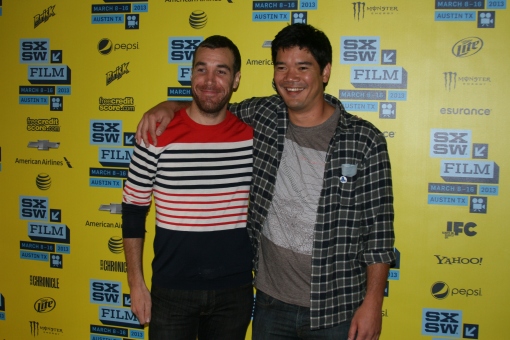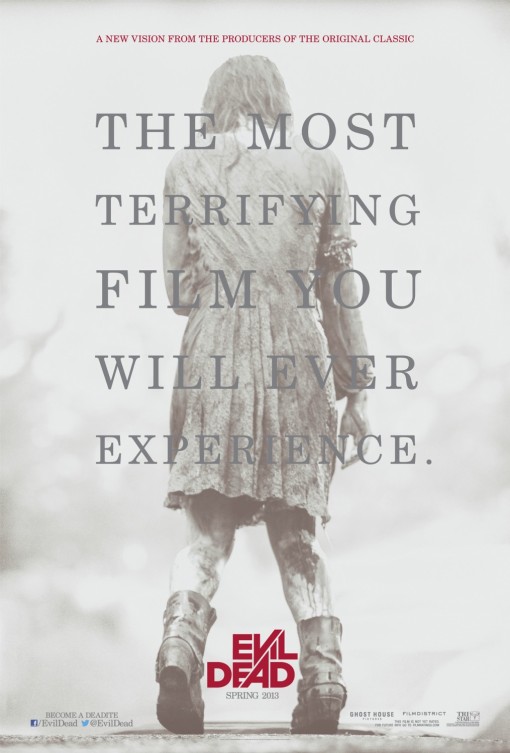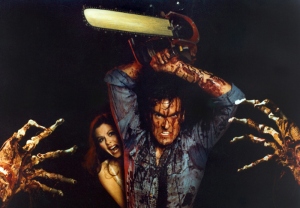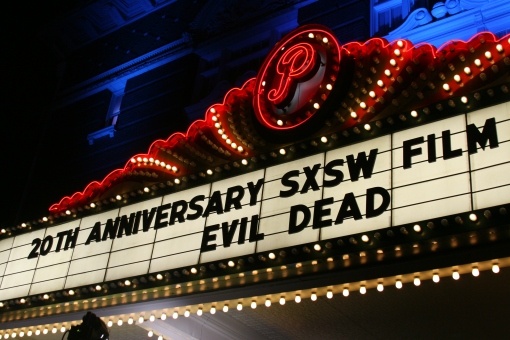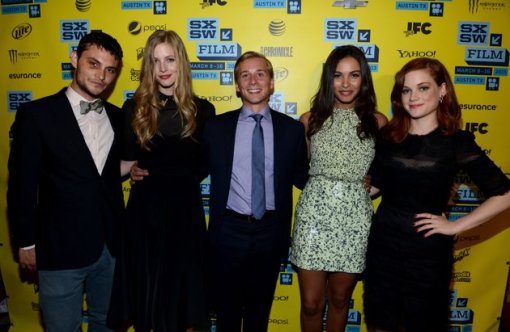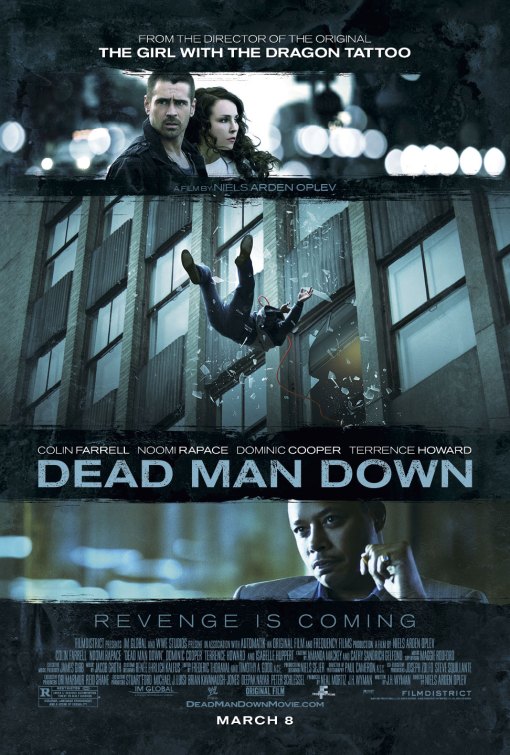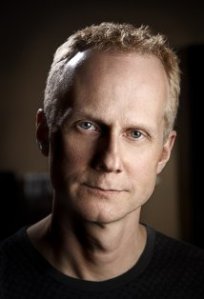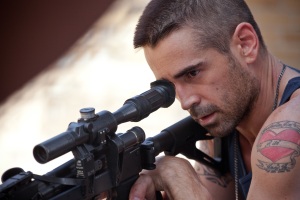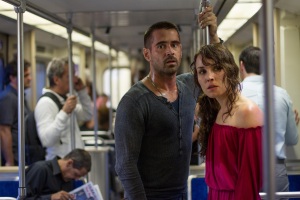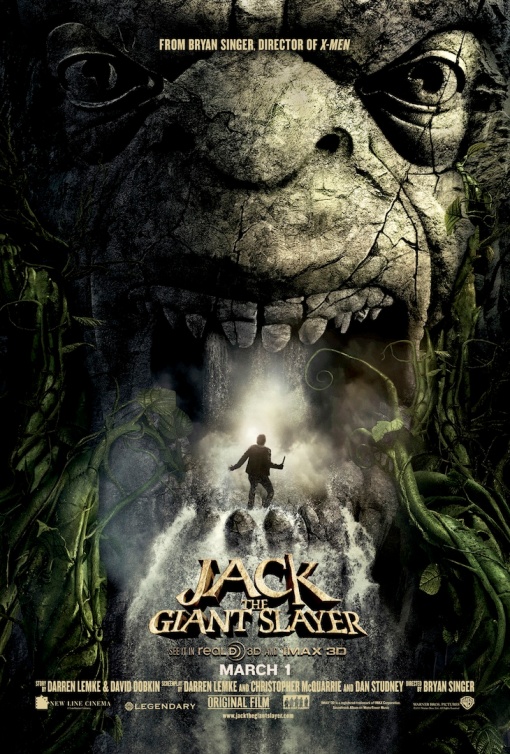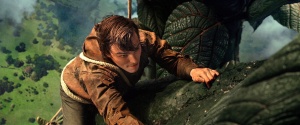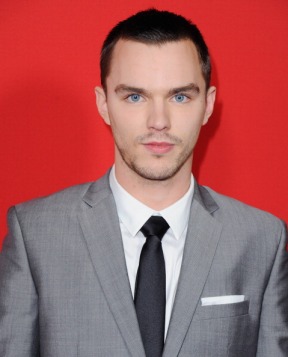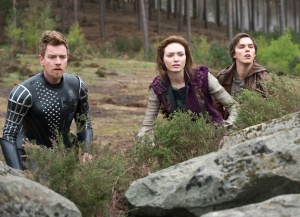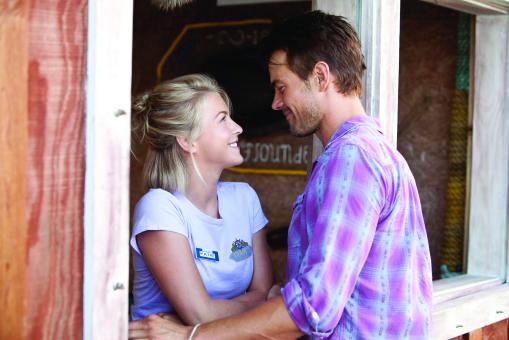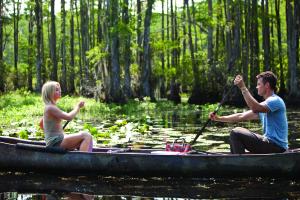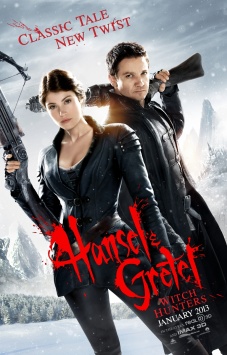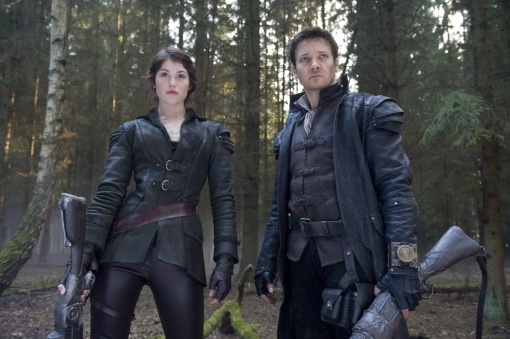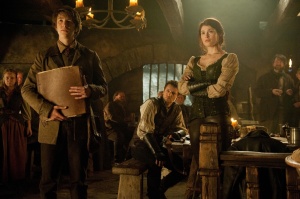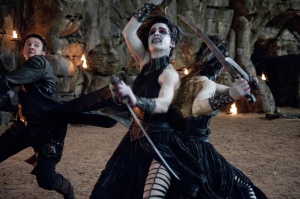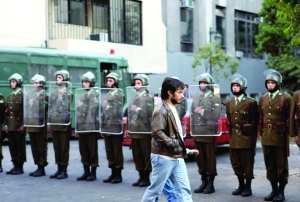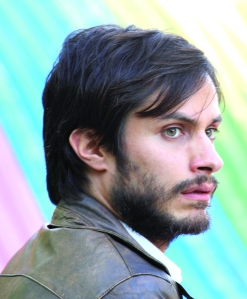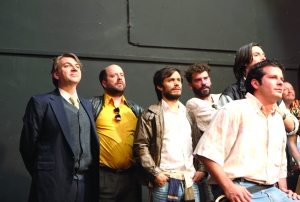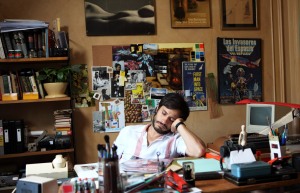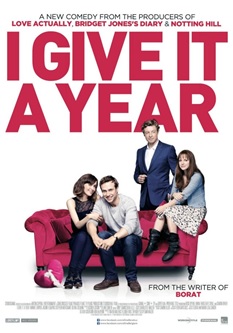
AUSTIN — While Dan Mazer is usually known for his script work with Sacha Baron Cohen on films like “Borat” and “Bruno,” he has stepped up behind the camera for his directorial debut with “I Give it a Year.”
The film follows an unlikely pair named Nat (Rose Byrne), an ambitious businesswoman, and Josh (Rafe Spall), a struggling novelist, through their first year of marriage. While they at first fall deliriously in love, they begin to discover that perhaps Josh’s ex-girlfriend, Chloe (Anna Faris), and Nat’s American client, Guy (Simon Baker), might be better suited for them.
Mazer and Baker sat down with myself and two other journalists to talk about being burned out by typical romantic comedies, the trust between actor and director, and whether or not any doves (or actors) were harmed in the making of this film.
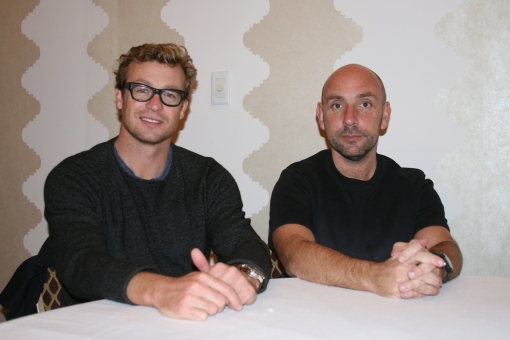
After the round table at the Intercontinental – Stephen F. Austin Hotel in Austin, Texas on 3/10/13.
(Photo Credit: Alex Gonzalez)
(Q represents a question from another outlet, and AG stands for a question from myself)
Q: I read the press notes and everything. Can you talk a little bit about improvisation in this film?
DM: I’m sort of a great believer in things feeling natural and real and authentic, and I think a lot of that often comes with a bit of improvisation. It’s interesting, because I wrote it as well as I directed it. Bizarrely, you’d imagine I’d be more precious about the words than perhaps somebody who hadn’t wrote it, but I sort of realized the process and it was raucous. I thought some of these jokes might just be shit (laughs). I was very encouraging of the actors to sort of improvise. The philosophy is that I wrote it, tried and tested it one way. “Let’s have a go. Let’s get the script into words and see what happens.” In the casting, one my primary objectives was to find people who were funny and sharp and bright and witty. I sat down with all the actors as opposed to just kind of reading most of them and sat in a room and chatted with them and laughed with them. I thought, if they do have all those attributes, if they are bright and funny and can sort of think on their feet – which some actors can and some actors can’t – then I sort of wanted them in the movie. I was very encouraging of a bit of improvisation, because then I essentially get the credit (laughs).
Q: So you’re okay with your actors maybe criticizing your script a little bit, like, “Hey, I think this might work better this way.”
DM: Yeah. I hate to deference in any shape or form. I’m certainly very good at not being deferential.
SB: It’s funny, because so often you get asked questions about improvisation and how it works in films. It’s such a loose term, because I always think it’s like the controlled improvisation. I mean, Dan wrote it, but there’s a lot of people that get this idea that writer/directors are like, “These are my words, this is the Bible, this is the Holy Grail. Don’t mess with it.” But Dan had this sort of next step on confidence in like, “I’m cutting this thing,” which means, in essence, “I’ll take whatever is going to come out, but before it gets passed on to anyone to watch, I’m still editing, so I’m still the writer in essence.” (laughs) So there was a lack of sort of any kind of fear. I mean, I thought with Dan there was no fear. I didn’t improvise at all. I barely improvised.
DM: Well, your character was different.
SB: Well, it depends on what I’m doing. My character didn’t really lend itself on that in this particular piece. Obviously, Rafe’s character totally was that character. Rafe and Dan had this thing where he would just go, and sometimes we’d all be sitting there going, “Where the fuck is Rafe going? Where is he going with this?” and Dan never got like, “Actually…” (makes disapproving face) You know, he just let him go. It’s an interesting game, because really, when you do improve – like, I improve a lot on my show (The Mentalist), but that’s sort of the role. In this, I had to sort of hit certain beats off of what other people were doing. It’s a very interesting game to see the trust between an actor and a director. It was interesting for me watching Rafe and Dan, because Dan didn’t get panicked. This comedy stuff, when it’s really like a full-blown comedy, it’s quite serious business. “Oh, that’s funny, that’s not funny, that’s funny.” It’s like, “Oh, geez.” It’s okay if you’re doing a drama and you throw a couple of gags in there, because no one’s expecting it to be funny. When you say, “This is a comedy,” it’s like saying to a woman before you have sex, “This is going to be some great love-making.” Right? (laughs) You set yourself up for sort of a situation.
DM: Oh, I’ve never done that.
SB: Nor have I! I’m always like, “This is going to be shit, but I’ll do my best.” (laughs) But yeah, it’s interesting like that, with the rules. Also, from watching Dan, he’s not undermining Rafe’s confidence when he is going off somewhere where it doesn’t necessarily work, he’s not going, “That didn’t really work,” because that can really crush you. Rafe had a big responsibility in this film, and he had to pull off a lot. He had to be a twat that’s sort of likeable and entertaining, but shouldn’t really be with this girl. It’s sort of a hard thing to do, a hard ask for a character. I thought he did it quite well. I thought you handled that really well.
DM: Thank you, you’re very kind, sir. Oh, Simon Baker (laughs).
Q: When you’re on the other end, and you’re watching them sort of doing some improvising, can you feel where it’s kind of not going anywhere like what you were saying?
SB: No, because a lot of the time I was this straight guy kind of waiting, just a little bit. Like anything, there’s the direct route, and then there’s the scenic route. Sometimes we get very scenic, and then we’re like, “Finally, we’re back on the main road again.” In my head, I was always often thinking, “That one works.” The cut is like a house of cards. Obviously, Dan knows more about this than I do. With this particular film, once you get into the edit, it can be like a house of cards. You really like this gag, but in order for that gag to work, you’ve got to have this bit and this bit and this bit.
DM: Obviously, I’ve spent the last 10 years with Sascha [Baron Cohen] where it’s a lot of improvisation. I’ve become, hopefully, quite adept to seeing what works and what doesn’t. Often, he can go off for an hour and a half, and you get like a minute out of it. You’re constantly thinking, “What minute is good?” So now this, in contrast, was much more controlled.
Q: Simon, what was it that drew you to the script when you first read it?
SB: I’ve read a lot of romantic comedies, like all of those “26 Dresses.”
DM: Or “27 Dresses.”
SB: (laughs) The prequel! They changed one number.
DM: Finishing the script, it was like, “I think we need another dress.”
SB: Yes, 27 is much more romantic. No, but I’ve read a lot of those. Ever since I did that movie, “The Devil Wears Prada,” I was sent a lot of those. Obviously, they always wanted me to play the guy that was an asshole, basically. They all tick these certain boxes of those sort of clichés of the genre. What I liked about this movie was that it actually ticked all those boxes of the genre but flipped them all upside down. So it was like, “Okay, we’re going to tick all those boxes, so we’re hitting the nail on the head with all of those bits that we expect, but we’ve got a total reverse story.” I thought that was just a fresh and interesting way to go about it. Little did I know that some people get a little bit like, “Well, what does that say about marriage?” Is this movie really about marriage? We’re just trying to make a piece of entertainment that takes the piss out of how far and how serious we are about the notion of committing to a marriage and sticking with it. I don’t know many people, but I’m from a broken home. My wife is from a broken home. So many people understand divorce. If they haven’t been through it, they certainly know someone that has been through it. Everyone knows the dreaded relationship where you lose a friend, because you’re like, “Oh no, please, what? That’s it. I can’t be friends with you anymore, because I can’t stand your wife!” (laughs) It’s like, “Can you come? Please don’t bring the missus. Of course she’s invited.” You know, the politics of that that we don’t talk about, is funny and interesting and awkward. I thought that was great. I thought, obviously if you can pull off that, that first anniversary scene. It was the most romantic moment in the whole script, I thought, when these two are being honest with each other and saying, “You’re not really the person that makes my heart sing.” I thought that was the challenge in the whole movie, and I was interested in that. I hadn’t done anything like this, so it’s always a challenge, sort of interesting.
AG: Kind of a random question, but you as a director, since this is so opposite of a romantic comedy, are there any famous couples or famous storylines in movies that you would love to take this route with?
DM: That’s interesting. Sort of all of them, really. If you take any romantic comedy, to me it’s sort of incredibly fascinating to see what happens the moment the credit rolls. If you talk about “What Happens in Rome” or “27 Dresses,” most romantic comedies are about people who absolutely shouldn’t be together. That’s the point of a romantic comedy. It’s like, “Look at these opposites. They’ve attracted. Isn’t it going to be fantastic?” The cynic in me is sitting there like, “Well, it’s not going to be fantastic. They’re unbelievably ill-suited for each other. They’re going to get back from their honeymoon, and the thing that annoys you about the Irish sheep farmer, if you’re the San Diego PR girl, will absolutely drive you crazy within a week of moving in with each other, and it’s going to end in a horrific and acrimonious divorce.” So you sort of think, with all those things, it’s kind of the realist in me that looks behind the Hollywood curtain, if you like. I think you can take any romantic comedy, and almost all of them will end in divorce (laughs).
Q: I thought it was kind of interesting, because you made Anna Faris’ character and Simon’s character not conniving or evil trying to break them up. They were just kind of on the outskirts. His character didn’t even really know. I thought that was an interesting take. You obviously did it on purpose, because it follows the romantic comedy line to have this person trying to do something back-handed.
DM: Exactly. That tends to be what happens in a romantic comedy. A nasty guy swoops in and sweeps the girl off her feet. You think, “Please don’t end up with him, because he’s not very nice.” The challenge in this is that you’re rooting for a couple to split up. That’s really hard to do and not make it toxic and [make you] feel bad at the end when they do split up. So in order to do that and facilitate that, you need to pick another protagonist who you sort of want them to end up with. If they are kind of nasty or horrible, you’re going “Oh, don’t end up with that person.” You actually want them to end up with that [other] person, because Guy, Simon’s character, is lovely. He’s brilliant. Again, that was the interesting thing in Simon taking the part. When you see him on screen, you have an expectation. “Oh, he’s going to be a nasty guy. He’s going to come in and blah, blah, blah.” What’s brilliant, and what Simon does brilliant, is kind of flip that expectation. Guy’s actually a bit of a doofus, so you’re happy they end up with each other. Simon does that brilliantly. So the reason they’re not nasty is because ultimately, you want our characters to end up with them.
Q: Did you know Simon prior to this?
DM: Oh, no, not at all. Obviously, I knew Simon’s work and loved it and thought it was brilliant and just thought I would be only so lucky to have him. Obviously, the casting process was like playing Fantasy Football for me in a weird way. I came in and go, “Oh God, I love Simon in that, he’d be the perfect Guy; I loved Rose [Byrne] in ‘Bridesmaids,’ she was fantastic. I’ve worked with Anna [Faris] on ‘The Dictator,’” so, you know, it was amazing to have the opportunity to go out to these people. It was incredibly thrilling when they said yes. I think, universally, even if you don’t like the film necessarily or have problems with the film, universally everyone said “My God, you’ve got an amazing cast.” Almost in a way to kind of say, “How’d you fuck that up?” (laughs)
SB: That’s so English of you.
DM: (laughs) I got warned beforehand!
SB: I’m not even English, but it’s still in there.
DM: The PR people, before you come to America, just go, “We know you’re self-deprecating, but don’t be self-deprecating. Americans don’t understand it. They’ll just think you think the film’s shit.” (laughs)
SB: Oh, you’re so cute.
DM: Like Hugh Grant bumbling, sort of.
Q: So is this almost the romantic comedy for people that don’t like romantic comedies?
DM: I think it sort of is. I’ve been burnt, as it were, by riding on an airplane or sitting down on a Tuesday night and going into Netflix and thinking, “Oh, this would be fun to see, this kinky story of this mismatched couple.” Most romantic comedies are neither particularly romantic nor particularly comedic, so it’s really a slightly pejorative term, “romantic comedy.” You go in with an expectation, and I understand why people want to market this as a “romantic comedy.” People go and see romantic comedies, so it’s not really a difficult sell. To me, it’s a movie about relationships as opposed to a romantic comedy, really.
AG: So what were the biggest challenges for both of you in flipping this genre on its head?
SB: There wasn’t really a challenge for me in that regard. I mean, it was all kind of laid out there for me. It was just the process of doing it, which always has its little challenges here and there, but there were no real major challenges. Like Dan’s saying, what the idea of a romantic comedy is, and it’s a term that I don’t really like. It does set you up. You look at a film like “Silver Linings Playbook,” and it’s really a drama. It’s a family drama that has romance in it and some comedic moments, but they’re focused on it being a story about a family and a guy kind of getting back into the family. When you do a film that is a “romantic comedy,” you think, “You’ve hit me with romance, now where’s the comedy?” If you don’t have equal parts, then you’re in trouble. No challenge. I really always, I don’t get to do a lot of films because of the amount of work that I do on my TV show, so when I do something, particularly if it’s in a mainstream sort of genre like we’re looking at here, I want it to be something that’s sort of fresh and interesting. I’d rather take the chance on something like “I Give it a Year” and take that risk than go and do the standard tried and true obvious choices that come along. There weren’t really any challenges in it for me. I mean, just logistically, walking off one set and walking onto another was the only kind of challenge.
DM: I think for me probably it was, like, just to actually try and make it romantic in some ways, because my natural instinct is my previous work. I definitely am much more towards the comedy side of things, and I have quite, sort of in life, a relatively cynical view of things and kind of, as a reaction to those romantic comedies, I was like, “Don’t want any sop in this,” because you feel like you’re selling out. So the challenge was really to make the romance feel real and authentic within a comedy framework. I was always very confident about the comedy part of it and just needed to kind of steer myself to make the romance not really feel cheesy. That was my challenge.
Q: No doves were harmed in the making of this film?
DM: Oh no, loads of doves. Loads of doves! (laughs)
SB: You would see on set just a pile of dead doves. No, I think Rose was harmed more than the doves. I think there was someone in the back of the truck that we didn’t see spray painting pigeons white, like, “Two more!” (enacts spray painting pigeons) No, that was a tricky day. Rose was genuinely petrified, properly frozen in fear.
Q: That made it much more fulfilling onscreen. You could tell, that’s not acting.
SB: On the DVD, there’s going to be an amazing kind of sort of blooper reel of her just like, “Ugh, oh, no!” (squirms) It’s about eight minutes long (laughs)That was a good day. We enjoyed that. We rehearsed that, too, didn’t we? We rehearsed with doves. I remember, at the church, doing rehearsals, and I remember at the end of that day, looking over at you across the room and you were so sort of restrained that you were like, it was almost like an eye roll and a sigh at the same time without doing anything, going “How are we going to do this?”
DM: It was May the 17th or whatever.
SB: Then, when the day came and we drove out to this pretty location out in Pinewood, it was a beautiful location. We got there, and Dan was like (makes anxious face). As soon as the doves came out, Rose was like (jerks around nervously).
DM: It was amazing to have an animal scene and not be worried about the animals at all. The animals, we knew they were going to behave. It was actually the star that was the worst (laughs). You didn’t love them, but you were just…
SB: No, I didn’t love them, but I was just trying to keep the woman from running away.
DM: Very manly.
Q: Great job by the violinist in that scene.
DM: Yeah, he’s a brilliant sketch comedy performer in Britain. He’s got his own TV show, and he’s really funny. He will be a big hit at some point in his life.
Q: How did you get Stephen Merchant on board to do this? You don’t see him in many films.
DM: No, you really don’t. I know Stephen. I knew Stephen a bit from around, and he’s the only part I wrote with someone specifically in mind. I wrote it and wanted Merchant to do it. I wanted it in his voice. “I know how he’d do it, he’d be brilliant at doing it.” Because he doesn’t do much, I was like, “Oh, he probably won’t do it, but we’ll just get someone to do a sort of Stephen Merchant impression.” (laughs) He read it and was just like, very simply, “Yeah. Funny. I’ll do it.” It was an incredible thing. We made it work in his schedule, and obviously he’s a scene stealer in every scene he’s in. It was a real thrill to me in terms of he’s sort of comedy royalty in England. To have one of your peers think that what you’ve written is kind of up to his standard, as it were, was incredibly thrilling for me. That was really nice.
Q: You guys mentioned rehearsals. You had rehearsals before you started filming? Before any film was shot, you had rehearsals?
DM: Yeah, we did a couple of weeks. Again, just as part of the process, I thought it would be nice to stand stuff up and see what would happen, encourage improvisation at rehearsals and play around with things, just really work it all out.
SB: It’s pretty luxurious. Doesn’t happen very often. No matter how, when you really look at it, it’s very vague, but what it does it get it all a little bit of, you get to have a little chat, things come out, ideas get popped up. Sometimes, when you get to shooting, all of that’s forgotten. It’s just something to sort of work through. I thought that was fun and luxurious.
DM: It really helps on the day you turn up at your place. Sometimes you just throw everything out and say, “I wasn’t really expecting that to happen.” Often, it just saves you that first hour, or an hour and a half, in the morning of your shoot where you can actually be getting stuff on camera as opposed to working things out. It was great, I loved it.
